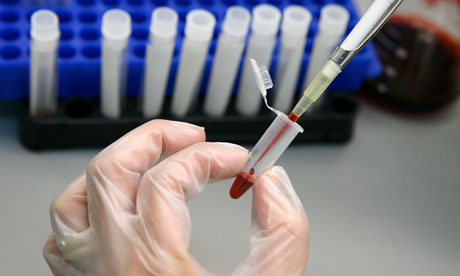
I am an object lesson in what happens if you don't get tested early enough. By the time I was rushed to hospital (at 2.30 in the morning, while staying with my parents) with rigors (fits caused by acute septicaemia), I had already had pneumonia twice and hosts of other unlovely afflictions, most gruesomely epididymitis, which causes the testicles to swell to the size of grapefruit and is (unsurprisingly) excruciatingly painful. For three days I passed in and out of consciousness while doctors pumped into me what was later described as "so much antibiotic it may as well have been bleach".
I remember very clearly the doctor giving me the results of the blood test. "I've got some very bad news," he said. "Really," I told him, "it's fine." I'd known for years that I was positive, and – despite working in the gay media, and being friends with the filmmaker Derek Jarman, at one time the most famous living HIV+ person in the country – I was unable to say the words "I'm positive", terrified that if I tried to let them out of my mouth they would choke me.
For a certain generation of gay men (I'm 42) who grew up without access to progressive ideas about gay life, the idea that sex and death were inextricably linked poisoned the psyche; like anything one is afraid to name, it held a terrible power.
"You don't understand," the doctor said, visibly uneasy. "We've lost the sample. I'm so sorry." I could only laugh. The inevitable result of the second test came; alone in a room full of late September sunlight I felt an involuntary belly laugh – from the diaphragm, the happy equivalent of uncontrollable sobbing – force its way up through my body: it was pure relief.
My diagnosis, in September 2006, was a liberation. In 2007 I developed lymphoma – a cancer that's more prevalent the longer HIV goes untreated. Cancer? Now that's a frightening diagnosis; I survived. I am open with everyone about my HIV status: not to speak about something is to collude with the idea it is unspeakable. Every single HIV+ person who is open with their friends and family makes it easier for the next person afraid to be tested, afraid to speak, carrying their secret like an undiagnosed infection. Silence, as Aids activists Act Up used to say, equals death.

